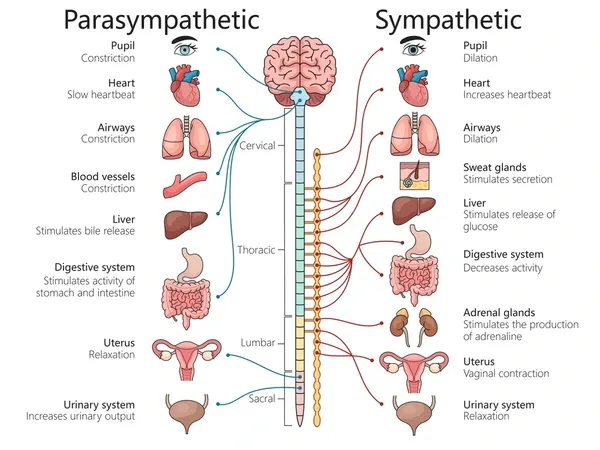Master Stress and Regulate Your Nervous System
Discover how stress affects your spine and health, and learn proven methods to build resilience and create inner calm

Stress is the #1 reason health declines.
It's also the #1 reason subluxations develop and persist.
At Family Chiropractic, we see this truth demonstrated daily: patients who manage stress effectively heal faster, maintain their corrections longer, and experience better overall health outcomes.
Here's what most people don't realize: Chronic stress keeps your nervous system stuck in "fight or flight" mode. When your nervous system is constantly in this heightened state:
- Your muscles tense up, creating and perpetuating spinal misalignments
- Your body suppresses healing processes
- Inflammation increases throughout your body
- Pain intensifies
- Your immune system weakens
- Digestion shuts down
- Sleep quality deteriorates
- Your adjustments don't hold as well
We can adjust your spine perfectly, but if you're living in chronic stress, your body will continue creating subluxations and working against its own healing.
This is why "Think Well" is one of the four essential pillars of vitalistic health.
Grab our Stress Resilience Toolkit below
The Stress-Spine-Health Connection
WHAT IS STRESS?
Stress is your body's response to any demand or challenge. It can be:
Physical Stress:
- Injury or trauma
- Poor posture
- Lack of sleep
- Overtraining or under-moving
- Illness or infection
- Pain
Chemical Stress:
- Poor diet and nutrition
- Toxins in food, water, air
- Medications
- Alcohol and caffeine
- Dehydration
Emotional/Mental Stress:
- Work pressure and deadlines
- Financial worries
- Relationship challenges
- Loss or grief
- Major life changes
- Constant worry and anxiety
- Feeling overwhelmed
All three types of stress affect your nervous system the same way—by triggering your "fight or flight" response.
YOUR TWO NERVOUS SYSTEM MODES
Your autonomic nervous system has two branches that work like a gas pedal and brake:
SYMPATHETIC NERVOUS SYSTEM: "Fight or Flight" (The Gas Pedal)
Designed for: Short-term emergencies and survival situations
What it does:
- Increases heart rate and blood pressure
- Speeds up breathing
- Dilates pupils
- Diverts blood to muscles
- Releases stress hormones (cortisol, adrenaline)
- Shuts down digestion
- Suppresses immune function
- Increases muscle tension
- Heightens alertness
This is GOOD when: You're facing real danger (like being chased by a bear)
This is BAD when: It stays activated chronically (which is what happens with modern stress)

PARASYMPATHETIC NERVOUS SYSTEM: "Rest and Digest" (The Brake)
Designed for: Healing, recovery, and maintenance
What it does:
- Lowers heart rate and blood pressure
- Slows breathing
- Activates digestion
- Turns on immune function
- Promotes cellular repair
- Releases tension from muscles
- Supports hormone balance
- Enables quality sleep
- Allows healing to occur
This is where healing happens. Your body can only truly heal when in parasympathetic mode.
THE PROBLEM: CHRONIC STRESS KEEPS YOU STUCK IN "FIGHT OR FLIGHT"
Modern life bombards us with stress constantly:
- Traffic and commuting
- Work deadlines and pressure
- Financial concerns
- Relationship challenges
- Health worries
- Information overload (news, social media)
- Lack of downtime
- Poor sleep
- And yes—spinal subluxations themselves create stress on your nervous system
Your body can't tell the difference between being chased by a bear and being stuck in traffic or worrying about bills. It responds the same way: fight or flight.
When this response is activated chronically, your body literally cannot heal optimally.
HOW CHRONIC STRESS CREATES SUBLUXATIONS
This is the vicious cycle:
- Stress triggers muscle tension (especially in neck, shoulders, and back)
- Chronic muscle tension pulls vertebrae out of alignment
- Subluxations develop, creating nerve interference
- Nerve interference keeps nervous system in stress mode
- More stress hormones release, causing more muscle tension
- Cycle repeats and worsens over time
This is why stress management is essential to your chiropractic care. We can adjust away the subluxations, but if chronic stress keeps recreating them, we're fighting an uphill battle.
At Family Chiropractic, we want to equip you with practical tools to manage stress and regulate your nervous system. These aren't just "nice to have" practices—they're essential for your healing and long-term health.
About 55% of Americans report feeling stressed during the day. And 77% of people say stress interferes with their health.
You're not alone in dealing with stress. It's part of life. But you CAN build resilience so stress doesn't control you or sabotage your healing.
HOW THIS TOOLKIT WORKS
These four tools all help shift your nervous system from "fight or flight" (sympathetic) to "rest and digest" (parasympathetic) mode.
Implementing all 4 tools will give you the best results. But if that's overwhelming, go at your own pace. Pick one tool to start, and once you master it, add another.
DownloadChiropractic
Back to homepage
Nutrition
Anti-inflammatory Recipes
Exercises
Support Your Adjustments

